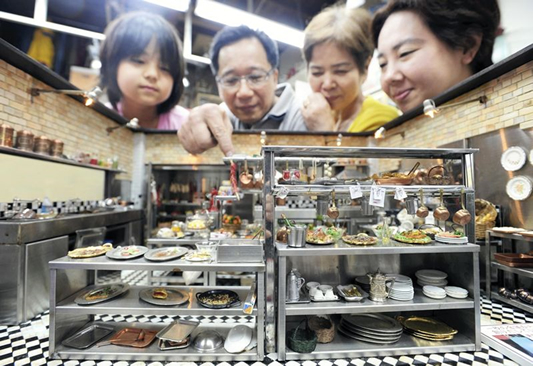 Posted on The Japan Times by The Yomiuri Shimbun on June 20, 2014
Posted on The Japan Times by The Yomiuri Shimbun on June 20, 2014
http://the-japan-news.com/news/article/0001358494
A remarkably accurate miniature kitchen is seen in Arakawa Ward, Tokyo.
Observing the miniature kitchen gives a sensation of being drawn into a miniature world.
By Kunihiko Miura / The Yomiuri Shimbun
A plate of gyoza dumplings smaller than a thumbnail and a glass of beer with a nice frothy head—a Chinese restaurant with these mouthwatering sights has been recreated on a micro level.
These miniature models were produced by Yukio Kawai, 64, who runs a metal stamping factory in Arakawa Ward, Tokyo, where a considerable number of small factories are located. His wife Tomoko, 64, and other family members lend him a helping hand.
The scale model of the Chinese restaurant was ordered by a woman in Kita Ward. She plans to close a Chinese restaurant that her late husband ran, and asked Kawai to recreate it, saying, “I’d like to preserve the restaurant, which is full of memories.”
Kawai took many photos of the restaurant and spent six months making a replica as accurately as he could, even down to the stains on the wall. The woman had tears in her eyes when she received the model.
“It feels like my husband could appear at any time,” she told Kawai.
Miniature dollhouses are extremely common in Europe, and dollhouse-making has become popular in Japan as well, mainly among homemakers. Kawai first started making miniature models when Tomoko, who was attending a dollhouse-making class, asked him to create a miniature pot.
The recreated restaurant kitchen contains a remarkably real-looking sink and cooking utensils, made with a stamping machine capable of processing stainless steel with great precision. Tomoko and other family members are in charge of making miniature food replicas from clay.
Small factories have been struggling as their orders have decreased. Kawai therefore started model production roughly 10 years ago under the name Mini Chuboan (kitchen). Today, model production accounts for 80 percent of the sales at his factory.
Kasahara Spring Seisakusho in Sumida Ward, Tokyo, is another struggling factory that has forged a path forward with a new idea. The company used to produce parts for industrial sewing machines but its workload decreased by half, so fourth-generation company president Katsuyuki Kasahara, 48, developed a business specializing in the production of tongs for serving food.
The company’s castanet-shaped tongs without a handle became a hit for their novel design and user-friendliness. In addition to their popularity in Japan, the product is also displayed in select shops in Paris today.
“I thought I couldn’t allow the company’s business to end during my time as president,” Kasahara said.
Small factories in Tokyo are branching out into new businesses with their wisdom and effort.
Original Article: The Japan Times by Yomiuri Shimbun
http://the-japan-news.com/news/article/0001358494


